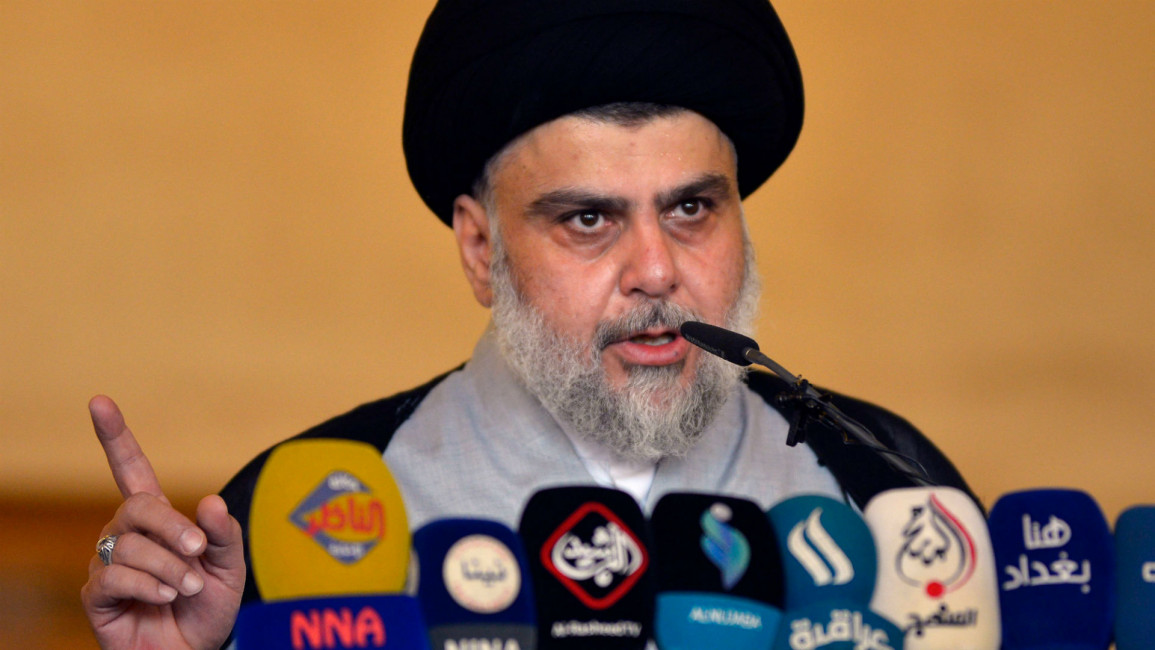Iraq cleric Sadr dissolves 'blue caps' force accused of deadly attacks on protests
"I announce the dissolution of the 'blue caps,' and I do not accept the (Sadrist) movement's presence in and of itself at the protests, unless it is absorbed into them," Sadr said in a tweet.
Over the last ten days, men wearing blue caps have raided protest camps in Baghdad and the Shia-majority south, with eight protesters killed in the ensuing violence.
Sadr, a former militia leader with millions of devoted followers across the country, first backed the rallies but split with the movement by endorsing Premier-designate Mohammad Allawi last week.
Sadr has faced growing criticism by young anti-government demonstrators for a dizzying series of tweets recently in which he backed, then abandoned, then re-endorsed protests.
The cleric's supporters, usually identified in protest squares by their blue caps, have raided rival demonstrators and the ensuing violence has left eight anti-government activists dead over the last week.
Nearly 550 Iraqis have been killed in protest-related violence since unprecedented anti-government demonstrations erupted in the capital and southern cities in October, the Iraqi Human Rights Commission said on Friday.
Comment: Protests bring Iraq's muhasasa system to its knees
543 people have been killed since October, including 276 in Baghdad alone, the group said, noting 17 members of the security forces are among the overall nationwide death toll.
Iraq's security forces have used live ammunition, tear gas, smoke bombs and even machine gun fire to try to disperse rallies in the capital and Shia-majority south.
The Commission found that many of the wounded or killed were shot by live rounds, but Iraq's government has repeatedly denied its security forces are shooting at the protesters.
Others have died when military-grade tear gas canisters have pierced their skulls or chests, after security forces improperly fired such equipment.
Twitter Post
|
The Commission did not lay blame on any particular side but protesters themselves have singled out armed factions and the military wings of political parties, alongside the security forces.
The United Nations, for its part, has accused unnamed "militias" for a vast campaign of assassinations, kidnappings and threats.
Sadr's supporters have at times stood by the protesters, sometimes protecting them from attacks by security forces and unidentified gunmen.
"Muqtada al-Sadr sent conflicted messages since the beginning but at the end he made it clear that he's against the protesters," protester Malek Jawad told Reuters.
Meanwhile, Iraq's top Shia cleric Ayatollah Ali Sistani condemned recent deadly attacks on anti-government demonstrators, chastising security forces for not doing more to prevent violence in protest squares across the country.
Sadr has a long-standing rivalry with the Hashed, formed to fight the Islamic State group in 2014, as many of its members defected from his own movement.
Read more: In 2020, Arab citizens and states will step up epic battle to define the region
In 2018, the cleric's Saeroon parliamentary bloc joined forces with the Hashed's political arm Fatah to form a shaky alliance that brought Adel Abdel Mahdi to the premiership.
Mass rallies have rocked Baghdad and Iraq's Shia-majority south since October, with protesters demanding snap elections and an independent prime minister as well as accountability for corruption and recent bloodshed.
On February 1, Iraq's bitterly divided political parties named Allawi as a successor but in private, government and security sources have expressed scepticism he will get his cabinet through the deeply-divided parliament.
Prime minister-designate Allawi has pledged to meet some of the protesters' demands.
Allawi has pledged early elections and promised to hold "aggressors and criminals" responsible for the killing of more than 600 protesters responsible.
Follow us on Facebook, Twitter and Instagram to stay connected


